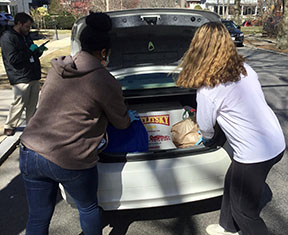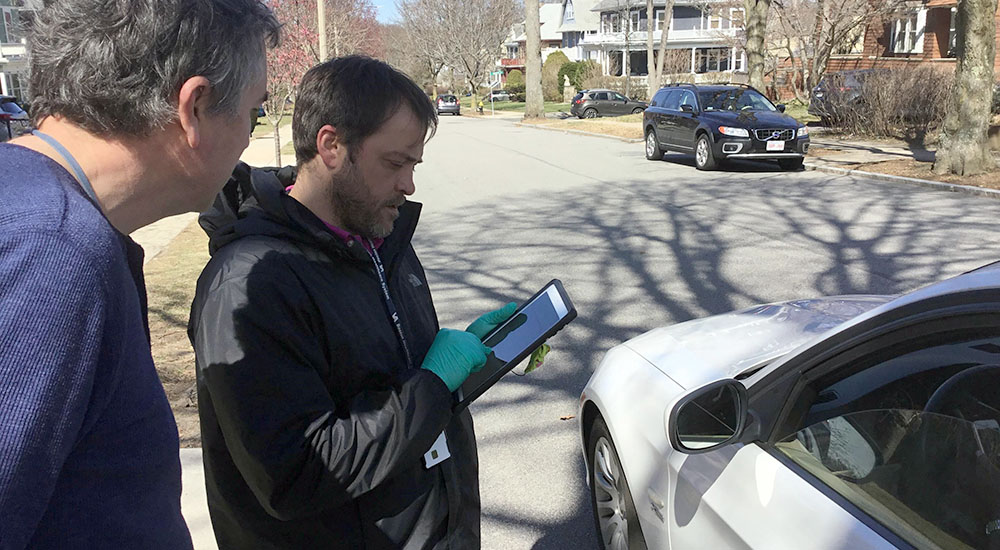When Charles Franklin created the Veterans Employment Rideshare Initiative (Rideshare) in 2018, he wasn’t thinking of how it could help in a global pandemic. However, when COVID-19 came to America, he did what any good innovator would do: he adapted. Franklin is the community employment coordinator at the VA Boston Healthcare System,

Volunteers from VA Boston’s HUD-VASH program load groceries into the trunk of a Rideshare vehicle to deliver to the doorstep of Veterans in need of food. Photo taken on March 1, 2020.
Rideshare helps homeless Veterans get to job interviews and find housing opportunities. Franklin saw that as housing costs in inner cities rose, Veterans moved outside the city. Consequently, public transportation was less accessible. As a result, it was a constant challenge for these Veterans to search for employment or attend medical appointments.
He began Rideshare to connect these Veterans with ridesharing services, like Uber and Lyft.
Project an instant success
Launching at the VA Boston Healthcare System and the Memphis VA Medical Center, the project was an instant success. He assisted 42 Veterans.
With support from the VHA Innovation Ecosystem’s VHA Innovators Network (iNET), the project has since expanded to include:
- VA St. Louis Healthcare System
- VA Western Colorado Health Care System
- VA Connecticut Healthcare System
- Manchester VA Medical Center
- VA Southern Nevada Healthcare System
- VA Central California Health Care System
- VA Palo Alto Healthcare System
- VA Northern California Healthcare System
- VA Pacific Islands Health Care System.
When COVID-19 hit, homeless and near homeless individuals were at a higher risk of contracting the virus. Also, they were unable to easily attain access to necessities.
Therefore, Franklin and the Rideshare team knew they had to help.
“We saw that the Veterans we serve were going to be hit hard by COVID-19. Many of their regular resources were closed down,” Franklin explains. “We knew we had this established network of ridesharing services and started looking into how we could use it.”
The effort connects Veterans not only with employment but also with food and care that they would otherwise not be able to receive without putting themselves and anyone they live with at a higher risk of contracting the virus.
In the photo at the top of this story, Franklin uses an iPad to confirm with a Rideshare driver the address of the Veteran who will receive the delivery of groceries.

Volunteers prepare two weeks’ worth of food to be boxed and delivered, contact-free, through VA Boston’s Rideshare program to Veterans at home during COVID-19. Photo taken on March 1, 2020.
Transporting food to Veterans
Franklin and his team leveraged the Rideshare network to pivot the program away from transporting Veterans themselves and transporting food to them instead. The Rideshare team is delivering food from food banks to Veterans in transitional housing in Boston, St. Louis, California, Nevada and Pacific Island VA facilities.
They also started providing transportation for all Veterans with weakened immune systems who were receiving radiation or chemotherapy and who would otherwise have to use public transportation in St. Louis. In Oakland, Calif., they use the Rideshare network to get homeless Veterans off the streets and into hotel shelters.
Since adapting Rideshare to help tackle COVID-19, the program has delivered over 325 boxes of food to isolated, high-risk Veterans. Each box contains a two-week supply of food. With help from the program, drivers have safely transported seven Veterans to their cancer treatments. Fifteen Veterans have received Rideshares to move them to hotel shelters.
The creative adaptation of this program has impacted more than 340 Veteran lives. This illustrates how front line VA employees rise to challenges and provide innovative, adaptive solutions to ever-evolving situations.
“I don’t know what I would have done if the VA and Uber or Lyft didn’t offer me these rides. Otherwise, I have no one who can drive me,” said Veteran Robert Bukirch of Waltham, Mass. Bukirch is undergoing a series of radiation treatments that require him to get therapy daily.
“I love VA and I love my country. This means so much to me. You guys literally saved my life. Thank you.”
Pallas Wahl is a public affairs officer for the VA Boston Healthcare System and a retired Army command sergeant major and Iraq War Veteran.
Topics in this story
More Stories
Veteran Byron Potier weighed almost 300 pounds and was tired and lethargic. He was the perfect candidate for gastric sleeve surgery.
How much do you know about VA care, benefits and services? Don’t miss out on what you've earned—check out the "2025 VA Federal Benefits Guide for Veterans, Dependents, Survivors, and Caregivers" handbook to learn more.
Feeling stressed? Your breath can help you relax and focus. Take 3 minutes to reset and prioritize your well being for this week's #LiveWholeHealth practice.







I need to know if you can assist VET with transportation Fresno VA to Palo Alto VA?
Amazing seeing the VA go above and beyond just regular Healthcare! That is how you take care of Veterans.